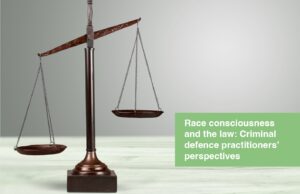Judging Maturity
The Sentencing Council should work towards developing formal sentencing principles for young adults, similar to the principles that are in place for children.
That’s the conclusion of a recent (July 2017) report published by the Howard League for Penal Reform and the Transition to Adulthood (T2A) Alliance.
The report, Judging Maturity: Exploring the role of maturity in the sentencing of young adults, presents research by the Howard League, who are a founding member of the T2A Alliance.
Context
Every young adult (18-25) is in prison because a court has decided to place him or her there. It is an active decision made by a judge. We know a lot about the difficulties that young adults face, from the high levels of self-inflicted deaths in prison to the huge increase in the likelihood of reoffending on release. Yet, in contrast to the focus on sentencing principles for children, there has been very little scrutiny of the sentencing process for young adults and how judges apply rules designed for fully formed adults to young adults.
Tens of thousands of young adults appear before the courts for sentencing each year. In its recent report, the Justice Committee raised serious concerns about the sentencing process applied to young adults:
Neither CPS investigating prosecutors nor sentencers have a sufficiently sophisticated understanding of maturity to weigh up how it may affect young adults’ culpability. In addition they do not routinely have the necessary information on which to make robust assessments about an individual’s maturity and hence take account of this in their reasoned prosecution and sentencing decisions. It is likely therefore that maturity is only considered primarily in cases where there is extreme immaturity.

The research
A substantial and growing evidence base has found that young adults aged 18-25 are a distinct group, largely because they are still maturing. Reaching adulthood is a process, not an event, and the key markers of adulthood, such as independent living, employment and establishing relationships, happen at different times for different young people.
Young adults face an increased risk of exposure to the criminal justice system compared to older adults. Contact with the criminal justice system also raises the risk of adverse outcomes for young people and increases their risk of reoffending. Although hundreds of thousands of young adults are sentenced each year, in contrast to the wealth of guidance and case law concerning the sentencing of children, there is no set of principles to guide sentencers through this process or ensure that they take a tailored approach to young adults.
The sentencing process presents an opportunity to apply the wealth of expertise concerning the development of young adults to achieve better outcomes. Senior court judgments and guidance concerning children, which acknowledge the reduced culpability of a person who is not yet fully mature, set a blueprint for an approach that could be consolidated and applied to young adults.
This research explores 174 senior court judgments with a view to capturing current judicial treatment of young adults, with a particular focus on how judges view the concept of maturity.
Key findings from the sample show:
- In almost half of all sentence appeal cases involving young adults neither age nor maturity were considered.
- The inclusion of age and/or lack of maturity in sentencing council guidance has not made a significant difference as to whether or not maturity is considered.
- Where the relevant sentencing guideline included age and/or lack of maturity, and the court considered that factor, it was more likely to result in a reduction in the sentence on appeal.
In addition, the research explored a number of references by the Attorney General in respect of sentences deemed to be unduly lenient and judgments reviewing the positive maturation of young adults who committed the offence of murder as a child. These cases illustrate that the courts are capable of taking a nuanced and thoughtful approach based on the actual development of the individual.
Recommendations
The research suggests that professionals need to be encouraged to bring these factors to the court’s attention and sentencers need to be encouraged to consider these factors of their own will. It also indicates that guidelines can make a positive difference and empower sentencers to reduce sentences on account of lack of maturity and/or age.
To bring about this change, the report recommends that the Sentencing Council should work towards developing formal sentencing principles for young adults, similar to the principles that are in place for children.
Blog posts in the Criminal Justice category are kindly sponsored by Get the Data which provides Social Impact Analytics to enable organisations to demonstrate their impact on society. GtD has no editorial influence on the contents of this site.









One Response
Interesting article and resonates with the “raise the age” campaigns in the US that advocate prosecuting this age group in the juvenile court rather than the adult court, and sending them to custody in juvenile units.